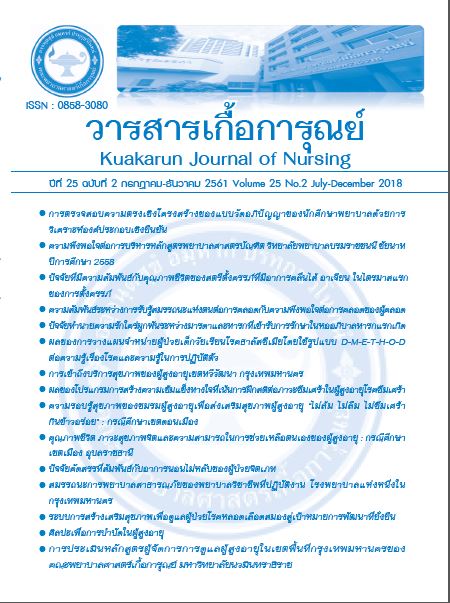Health Literacy of Elderly Club for Aging Health Promotion with 4 Smart (Walk Brain Sleep Eat) : Don Mueng District
Keywords:
Elderly, Health promotion, Health literacyAbstract
Abstract
This quantitative and qualitative methods objected to analyze and synthesize health promotion process of elderly club at Don Mueang district for enhancing
aging with 4 Smart (Walk Brain Sleep Eat) through PIRAB: Partner Invest Regulate and Legislate Advocate and Build capacity Ministry of Public Health, 2017) within social health literacy complements. The population was 24 elderly clubs from Don Mueang district. Three elderly clubs were selected as samples
through specific sampling technique. Ninety key informants were chairman and member of the elderly clubs. The questionnaire was verified for the validity of
the instrument. It was submitted to the experts to review its accuracy, content validity, and comprehensiveness was at 1.00. The reliability of the tool using
Cronbach's alpha was 0.958. As for focus group discussion guideline, experience lesson learned, participatory observation, in-depth interview and related
document, they were verified by triangulation - data, method, and researchers. Content validity and synthesis a new set of data were verified by table, relation,
and conceptual framework comparison. The results showed that 90 percent of elderly clubs were established between 5-10 years in the housing estate. Less than 50 members in elderly clubs are 70-79 years old organize the health promotion activities according to their leadership skills. However, the activities were not obvious, not continuing, not understood the aspect of health literacy organization, mostly focusing on the activities that reduce depression first. The outcomes from this research create health promotion mechanism for elderly clubs called “Smart by LITS (Leadership, Information, Team, and Stakeholder) model”. Leadership (L) composed of the involvement of committee and members, participation, and network seeking to achieve activity goals and welfares. Information (I) composed of collecting, organizing, and utilizing information for continuous and consistency of the projects or activities. Team (T) composed of coordinating with concerned parties for member benefits and working together for activity enhancement. Stakeholder (S) composed of working with present parties and seeking for new ones. For the research suggestions, the elderly clubs should appropriately analyze member’sneeds and extended to 4 Smart (Walk Brain Sleep Eat). Additionally, the activities should be concerned and prioritized with the goals of well practice by themselves and can pass on to others. The elderly clubs should be supported to proceed projects or activities, focus on continuous strengthening health literacy of elderly with periodically empower elderly club to achieve health literacy organization.

















